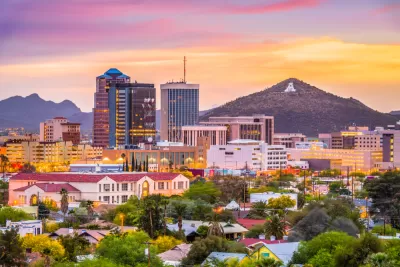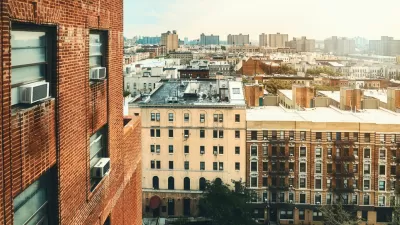Median rent in Tucson rose by 30 percent since a year ago, prompting fears of displacement among many residents struggling to afford housing.

“Rents are going up all over Arizona, as they are across the country, but Tucson, once considered sleepy and affordable, has seen a particularly painful spike.” As Brenda Muñoz Murguia reports in Phoenix Business Journal, “The median rent in Tucson in June was $1,795, up 30% from June 2021, according to Zillow data as of publication.” This is leading many longtime residents to relocate farther from the city center to more affordable neighborhoods.
“The redevelopment and push for upscale housing has put particular pressure on west Tucson and downtown.” According to the article, “Older neighborhoods that traditionally were lower income and predominantly Hispanic are transitioning to market-rate housing, pressured by new developments in nearby areas, with apartments renting for as much as $3,000 a month.”
Murguia points to one major factor impacting the desirability of these areas: the city’s “Government Property Lease Excise Tax, or GPLET, a tool that gives the city authority to grant incentives to build in particular areas.” Since its inception, Tucson has entered into 24 GPLET agreements, some of which converted affordable senior housing to luxury rentals. It should be noted that a 2021 study by University of Arizona professor Gary Pivo “found that GPLET projects were not the cause of gentrification, mainly because they constitute a small part of downtown development. However, it also said the GPLET program could do more to help people and businesses being displaced.” Pivo’s report “said GPLET should look for opportunities to create affordable housing for people who earn less than $35,000 a year.” Anecdotally, the article features the stories of several Tucson residents who struggle to afford housing and have had to move as rents rose.
FULL STORY: Rent hikes, downtown boom spur gentrification of older Tucson neighborhoods

Alabama: Trump Terminates Settlements for Black Communities Harmed By Raw Sewage
Trump deemed the landmark civil rights agreement “illegal DEI and environmental justice policy.”

Planetizen Federal Action Tracker
A weekly monitor of how Trump’s orders and actions are impacting planners and planning in America.

The 120 Year Old Tiny Home Villages That Sheltered San Francisco’s Earthquake Refugees
More than a century ago, San Francisco mobilized to house thousands of residents displaced by the 1906 earthquake. Could their strategy offer a model for the present?

Opinion: California’s SB 79 Would Improve Housing Affordability and Transit Access
A proposed bill would legalize transit-oriented development statewide.

Record Temperatures Prompt Push for Environmental Justice Bills
Nevada legislators are proposing laws that would mandate heat mitigation measures to protect residents from the impacts of extreme heat.

Downtown Pittsburgh Set to Gain 1,300 New Housing Units
Pittsburgh’s office buildings, many of which date back to the early 20th century, are prime candidates for conversion to housing.
Urban Design for Planners 1: Software Tools
This six-course series explores essential urban design concepts using open source software and equips planners with the tools they need to participate fully in the urban design process.
Planning for Universal Design
Learn the tools for implementing Universal Design in planning regulations.
Clanton & Associates, Inc.
Jessamine County Fiscal Court
Institute for Housing and Urban Development Studies (IHS)
City of Grandview
Harvard GSD Executive Education
Toledo-Lucas County Plan Commissions
Salt Lake City
NYU Wagner Graduate School of Public Service





























